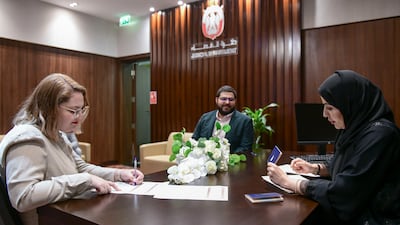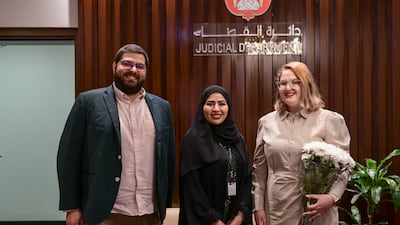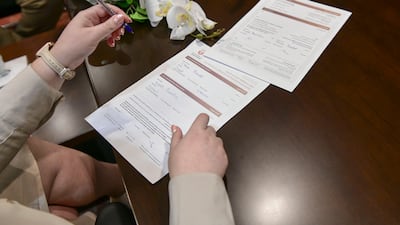A British judge has said an expatriate couple seeking a divorce should have their case heard in Abu Dhabi and not London, in what is thought to be the first judgment of its kind.
Judge Edward Hess rejected a petition by the woman's lawyer to have the separation of assets decided in the UK's Central Family Court.
Instead, he told lawyers in the case that they would be better served by the Abu Dhabi Civil Family Court, in the country where they have lived for 14 years.
He refused an argument by the woman's lawyer, Gerald Wilson, that the new Abu Dhabi court remains “embryonic” and that any decision by the court would be “determined according to Sharia norms”, arguing that it had only one Emirati judge.
Expatriate Law, UAE office
According to court documents, Mr Hess said he disagreed with that assessment.
"It seems to me that the new court has been set up with a view to giving assurance to non-Muslims living in the UAE that, if they do become divorced, they will be dealt with in a way which is commensurate with norms of non-Muslim countries," he added.
“I have no reason not to assume that any judge of the new court, whatever his faith, would deal with any case according to the statutory principles which have been summarised above.”
Local courts across the Emirates use a civil and criminal law that is based on Sharia. Among its rulings on divorce is one that says the man and woman keep both of their own assets.
The decision was made at the Central Family Court in September but has only just come to light.
The woman, aged 42 — who was not named in court documents, nor was her husband, aged 47 — issued divorce proceedings in the UK last year.
_______________________________
First Israeli civil marriage in Abu Dhabi court: in pictures
_______________________________
This was challenged by the husband, a solicitor for a UAE-based firm who said that divorce proceedings should continue in the Emirates, where they have lived since 2008.
He asked for the case to be deferred to the family court at the Abu Dhabi Judicial Department instead of the UK.
The establishment of the new Abu Dhabi court meant that for the first time, divorce proceedings would not be tried under Sharia.
According to documents, the couple are very wealthy, with the husband earning £850,000 (Dh3.8 million) a year, as a partner in a UAE-based law firm.
The couple have assets worth £4.5 million.
Documents state the wife looks after their children and has personal assets worth only £15,305.
Byron James, a partner at Expatriate Law's UAE office, said the case was a significant moment for the capital's new non-Muslim court system.
“This is the first time that the English family court has come to consider whether or not the Abu Dhabi non-Muslim family court should be considered 'forum conveniens' over the English courts," he told The National.
Forumconveniens is where one court takes precedence over another.
"The judge had to decide whether proceedings should take place in England or in Abu Dhabi, and decided that it should proceed in the Abu Dhabi non-Muslim family courts," he said.
"His reasoning was that the Abu Dhabi government has gone to the trouble of putting together a law for expats and whilst it's very new, and whilst there's lots that one could say about unknowns of how the discretionary aspects of the law might be applied, his view was that the new law should be given a chance to prove itself.
"That's really important because it's the first international recognition, as far as I'm aware, and endorsement of the non-Muslim family court of Abu Dhabi.
"And to have a country like England, saying, we will defer to this other country, for our own citizens to get divorced in is a real mark of respect.
"It's an incredible validation for a court that just opened."
It also means that people do not need to fight over jurisdiction as much as they used to, he said.
"It means that whether it proceeds in the non-Muslim courts of the UAE or whether it proceeds in their home country, they are going to have an outcome that feels more culturally appropriate."











